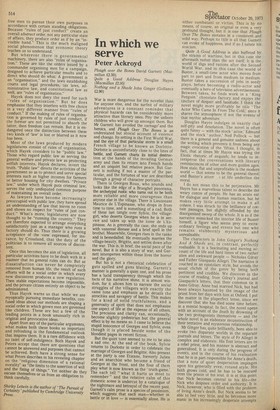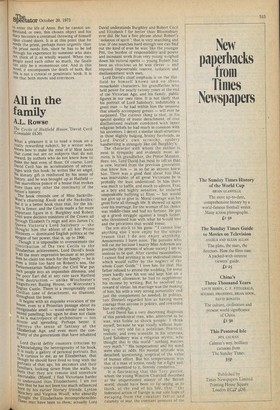In which we
serve
Peter Ackroyd
Plough over the Bones David Garnett (Macmillan £2.50).
Quite a Good Address Douglas Hayes (Macmillan 12.95)
Nothing and a Shade John Ginger (Gollancz e2.90)
War is more dangerous for the novelist than for anyone else, and the surfeit of military adventures is a constant reminder that physical hazards can be considerably more attractive than literary ones. Pity the unborn children who will grow up amongst them. But Mr Garnett has avoided the carnage" and the heroics, and Plough Over The Bones is an understated but stoical account ot violence and change. Its setting is the First World War, and the eye of that particular storm is a small French village to be known as Dorlotte. Dorlotte is uncomfortably close to the lines of battle, and Garnett charts its initial destruction at the hands of the invading German army and then its return into French hands and an unquiet but relative peace. But Garnett is nothing if not a master of the particular, and the fortunes of war are described through a group of character portraits.
There is Georges Roux, who sounds and looks like the edge of a Brueghel panorama, the archetypal rustic who turns out to be both more reliable and more courageous than anyone else in the village. There is Lieutenant Maurice de L'Espinasse, who drops in from time to time, and is something of a cad. Both of these last tangle over Sylvie, the villagegirl, who deserts Georges when he is in service and takes up with the loose de L'Espinasse. As is generally the case, she ends up with venereal disease and a brief spell in the brothel. Meanwhile, Georges rises in the ranks and is bemedalled. He eventually marries the village-beauty, Brigitte, and settles down after the war. This is, in brief, the social pace of the novel. But it is also a story of war, and Gar-. nett intersperses within these lives the horror and the glory. But his is not a rhetorical celebration of guts spilled and guns blazing. Garnett's manner is generally a quiet one, and his prose has a lucid transparency through which the tacts of his narrative shine. It is almost wisdom, for it allows him to narrate the social struggles of the villagers with exactly the same tone and emphasis as he details the atrocities and savagery of battle. This makes for a kind of solid truthfulness, and a generosity of spirit that does not emphasise one aspect of life at the expense of all others. The precision and clarity can, occasionally, become slightly pedestrian but the general effect is by no means so. I came to believe the stupid innocence of Georges and Sylvie, even though it is placed beside some of the bloodiest pages in recent fiction.
But the quiet tone seemed to me to be also a sad one. At the end of the book, Sylvie returns to Dorlotte in order to celebrate the marriage of Georges and Brigitte. Also present at the party is one Etienne, formerly Julien and an anarchist who became a friend of Georges at the front, and the four of them play what is now known as the 'truth-game.' The each tell "what it hurts us most to remember" and the relative calm of this domestic scene is undercut by a catalogue of the nightmare and betrayal of the recent past. Garnett's calm prose is a species of pessimism, which suggests that each man—whether in battle or in love — is essentially alone. He is
opecwim.pr October 20, 1973 either combatant or victim. This is by no means, of course, an original or even a very profound thought, but it is one that Plough Over The Bones sustains in a consistent and solid way. Perhaps its title is all that Garnett can evoke of happiness, and if so I salute his stoicism.
Quite A Good Address is also buffeted by the strains of wartime, but in this case the aftermath rather than the act itself. It is the world of digs and rations after the Second World War, and in this case the world of Buster, a small-time actor who moves from part to part and from medium to medium. Buster takes a succession of jobs in seedy plays, before becoming a radio-actor and eventually a hero of television advertisements. Between takes, he finds work in a ' King Penguin' chocolate factory and enjoys the tincture of despair and lassitude. I think the novel might more profitably be title 'The Actor Who Came In From The Cold,' since it shares the atmosphere if not the events of that mythic adventure.
Douglas Hayes indulges in exactly that self-pity and desolation. The novel is often quite funny — with the stock 'actor,' Edmund and the stock 'author,' Ned Pollock — but there is a general and genuine sadness about the writing which prevents it from being any magic evocation of the 'fifties. I thought, in fact, that at times Mr Hayes was trying the Eliotic rhetoric of anguish; he tends to intersperse the conversations with literary reminiscences of other and more golden ages. How stale, flat and unprofitable is the modern world — that seems to be the general.theme. and Buster's atterr ; at life underline the moral.
I do not mean this to be perjorative. Mr Hayes has a marvellous talent to describe the weary centre of people. He has an acute ear for dialogue and for human reaction, but he makes very little attempt to make it all cohere. I was struck by the brilliance of certain passages, but slightly offended by the disorganised sweep of the whole. It is as if the narrative mimicked the interior life of Buster himself, a figure who seems prey to extraordinary feelings and events but one who remains stubbornly mysterious and unrealisable.
The characters in John Ginger's Nothing And A Shade are, in contrast, perfectly realisable. It is a fascinating and moving account of the life and hard times of two rather alien and awkward people — Nicholas Gilray and Father Gianpaolo Allegri. The narrative is couched in an epistolary style, but avoids the usual clichOs of the genre by being both pertinent and credible. We discover in the course of reading, from Gilray's journal and Gianpaolo's letters, that their common tie is Anne Gilray. Anne had married Nick, but had been always haunted by the image of the priest from her days with him at Oxford. I put the matter in the pluperfect tense, since we discover that she has died some time before, in a mental hospital. In fact, the novel opens with an account of the death by drowning of the two protagonists themselves — and the whole novel is an elaborate reconstruction of their tentative and mysterious relationship.
Mr Ginger has, quite brilliantly, been able to evoke two disparate worlds in the separate journals and letters. The style of Fr Allegri is complex and elaborate. His first letters are to a rebel priest, and his manner is abstract and generalised. It is only during the progress of events, and in the course of his realisation that he is in part responsible for Anne's death, that a note of quiet desperation impinges upon his generally even, rotund style. His faith grows "cold, and he has to be rescued trom the prison ot his soul. It is at this point that Nick becomes central to his life—the Nick who despises order and authority. It is Nick, however, who is filled with the problem of living Anne's death. But Nick seems to be able to feel very little, and he becomes more manic in his increasingly desperate attempts
to enter the life of Anne. But he cannot understand, or own, this chosen object and his diary becomes a continual throwing of himself Upon closed doors. It is at this point that he needs the priest, perhaps more urgently than the priest needs him, since he has to be led through his experience by someone who does not think of it as wholly wasted. When two People need each other so much, the finale can only be a momentous one. And in this novel, it encompasses the death of both. But this is not a cynical or pessimistic book. It is one that both moves and convinces.



































































 Previous page
Previous page